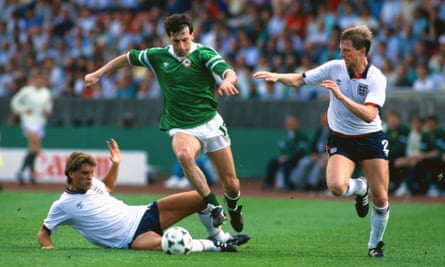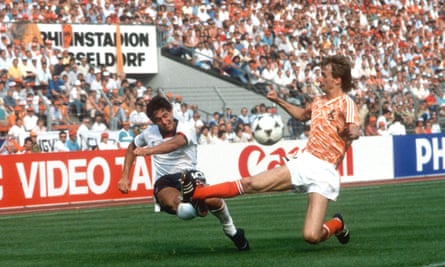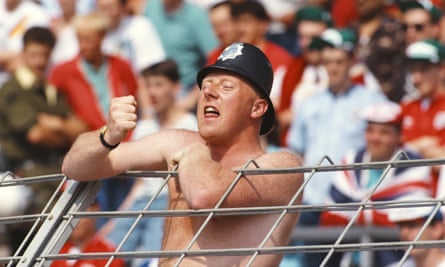Given the attacking players at Gareth Southgate’s disposal in Germany, England have a chance of going all the way at Euro 2024. They were not at their best against Serbia, but some of the complaints from fans and pundits have been a little over the top. There are bigger tests to come and a win is after all a win. Argentina won the last World Cup after losing their opening game to Saudi Arabia, so England should not be too downhearted.
Whatever happens this summer, England have already improved on their previous Euros in Germany. Bobby Robson’s team arrived at Euro 88 as one of the favourites but, after three defeats, he was left fighting for his job, with hooliganism, punch-ups, bed-wetting, illness, a snub from the BBC and a No 64 single all thrown in. England at Euro 88 was the very definition of an omnishambles.
The pre-tournament optimism was fuelled by an impressive qualification campaign. Robson travelled to Belgrade in November 1987 knowing a draw would be enough to take England to the finals. Within 25 minutes, England were 4-0 up and cruising. Yugoslavia’s 80th-minute consolation was the first goal England had conceded in the group.
“This result will raise a few eyebrows around Europe,” said Robson. “It’s never easy coming here and this result will have shaken one or two people.” England’s manager, boosted by the fact that league fixtures had been cancelled before the Yugoslavia match, was understandably confident.
“For the first time since the 1970 World Cup, England will be setting off for a major tournament with their case for winning it, or at least reaching the final, based on something other than patriotic sentiment,” wrote David Lacey in the Guardian. It’s the hope that kills you.
With just seven countries joining the hosts, there were some notable absentees in West Germany. Holders France failed to qualify, as did Euro 84 semi-finalists Portugal. World Cup semi-finalists Belgium were also missing. Drawn in a group with the Netherlands, USSR and Republic of Ireland, England were installed as second favourites at 5-1, the bookies naturally not wishing to write off West Germany, who were priced at 6-4.
England 0-1 Republic of Ireland, Stuttgart
For the 10,000 Irish fans who travelled to Germany, this was new territory. Jack Charlton’s direct style had paid dividends, helping the country qualify for their first major tournament. Eight wins in nine matches before Euro 88 suggested they were dangerous opponents. Nevertheless, England expected as ever.
Even after Ray Houghton scored a scrappy goal in the sixth minute, Robson’s team created chance after chance. But a combination of poor finishing and an inspired display by goalkeeper Pat Bonner kept England at bay.
Despite the 1-0 defeat, Robson was bullish. “It’s not irretrievable. We found ourselves in the same position two years ago when we lost our opening World Cup match to Portugal. We recovered then.” But the form of his key man Gary Lineker was a concern. When it was later revealed the striker had been suffering from hepatitis during the tournament, a beleaguered Robson must have cursed his poor luck.

The behaviour of English fans had long been a problem. In March 1985, as the FA finalised their bid to host Euro 88, rioting fans at the Luton v Millwall FA Cup match crushed any hope of success. The tragedy at Heysel led to English clubs being banned from European competition.
Trouble continued to follow the national team. Riots in Stuttgart after the defeat to Ireland led to more than 100 arrests, and the violence continued in Düsseldorf prior to the Netherlands match. The English were not alone in causing mayhem, with many Dutch and German fans involved, but any hopes of English clubs returning to Europe evaporated.
The situation was so bad that the government considered withdrawing England from the 1990 World Cup. “The immediate threat to England’s participation in the next World Cup is Mrs Thatcher,” wrote Lacey in an article discussing Robson’s future. Italia 90 seemed like a distant dream.
England 1-3 Netherlands, Düsseldorf
On the pitch England were all out of luck. They hit the woodwork twice against the Dutch in a performance that was not as shoddy as most of the reports would have you believe. But Marco van Basten, who had undergone two ankle operations in the previous year, proved the difference.
After Van Basten’s opener just before the break, England captain Bryan Robson briefly restored hope with a typically thrusting run and finish. But two more goals from Van Basten extinguished the lights. Ireland’s draw with the USSR later that day meant England were out of the tournament. The press rounded on manager Robson.

Robson’s bad luck had started a few days after the team qualified in Belgrade. Playing for Rangers against Aberdeen, Terry Butcher broke his leg and was ruled out of Euro 88. His absence left a gaping hole in terms of experience and leadership. With Butcher missing, Mark Wright and Tony Adams formed a centre-back partnership at the tournament.
Adams had taken to international football like a duck to water, but he slowly drowned in West Germany. The 21-year-old was outclassed by Van Basten and, as he explains in his gripping autobiography Addicted, the team drenched their sorrows after the 3-1 defeat. “When I woke up the next morning, my bed was soaked and a chambermaid was standing in the room holding her nose and saying ‘pee pee’.”
The Arsenal centre-back was not the only player feeling worse for wear the next morning. Skipper Robson punched Peter Shilton after the England keeper had unwisely called his teammate a bottler.
England 1-3 USSR
The BBC’s decision to show Ireland’s last game live instead of England’s dead rubber against the USSR summed up the tournament for Robson’s team. As the watching millions saw Ireland lose to a freak Shane Warne-style winner from Wim Kieft, England exited in an appropriately messy fashion. Adams got over his embarrassment by scoring his second international goal but the 3-1 defeat to the USSR left England pointless and Robson offering his resignation.
Fortunately, the FA chairman Bert Millichip ignored the manager’s request, but things were going to get worse before they got better. A goalless draw against Sweden in a World Cup qualifier provoked the headline: “In the name of God go!”. A month later “In the name of Allah go!” adorned the Mirror after a poor 1-1 draw against Saudi Arabia.

Eventually, Robson and England turned things around, squeaking through to Italia 90, and playing a full part in a summer that changed English football forever. Fittingly, World In Motion by New Order topped the charts during the tournament as England reached the last four. It was also apt that the Stock, Aitken and Waterman effort All The Way only reached No 64 during Euro 88.
Euro 88 somehow got over the absence of England, with the Netherlands finally lifting their first major trophy. Van Basten’s volley in the final against the USSR was the crowning glory, as a team overflowing with world-class players such as Ronald Koeman, Frank Rijkaard, and Ruud Gullit provided Rinus Michels with some closure from 1974.
England’s wait goes on. But if Euro 2024 ends in glory, Southgate will have his own redemption after 1996 and 2021. If not, the knives may be sharpened for him just as they were for Robson in 1988.